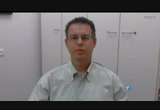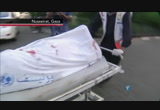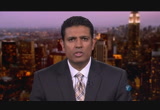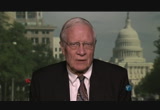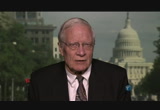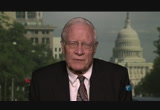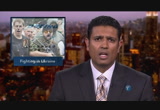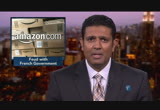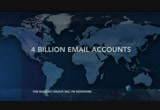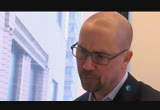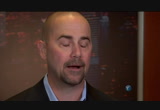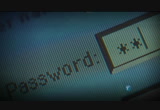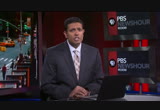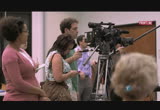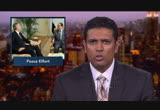tv PBS News Hour Weekend PBS July 12, 2014 5:30pm-6:01pm EDT
5:30 pm
on this edition for saturday, july 12th, israel destroys a mosque in gaza that it says was loaded with weapons. and intercepts hamas rothlisberger over tel aviv. we'll have a report from israel. a leading military analyst weighs in on that conflict and the intense new fighting in the ukraine. and in our signature segment, preparing for the inevitable. >> the year after somebody passes is one of the most vulnerable times for eye deputy theft. >> -- identity theft. >> next on pbs newshour weekend. made possible by lewis band lou
5:31 pm
ease herch if he would coleman, the wallace family, in memory of miriam and ira wallick, bernard and irene schwartz, the city found tation, rosalyn walter, corporate funding is provided by mutual of america, designing customized individual and group retirement products. that's why we are your retirement company. additional support is provided by, and by, the corporation for public broadcasting and by continue bias to your pbs station from viewers like you. thank you. from the tissue studios at lincoln center in new york. >> good evening, thanks for joining us. the latest round of middle eastern violence triggered by the kidnapping and murder of those three jewish teenagers escalated again today. tonight israel said its iron dome system intercepted three rockets fired over tel aviv and
5:32 pm
three others near jerusalem. earlier today israeli bombs destroyed a mosque on the gaza strip. israel said weapons were being stored there. at least 135 palestinians have died during the recent fighting. for the latest we are joined once again tonight from jerusalem via skype by josef federman. what israel says is the area was used to store rockets and other weapons. this has been a challenge, i think for israel from day one. it says that a lot of the weapons it's tacking are hit not guilty civilian areas like mosques, schools, res terrible areas, and it says it is taking precautions to avoid damage to these buildings and to civilians, but it is still sometimes these attacks take place. >> what about the pace of rocket fire from gaza? >> the situation in the south was a little more calm in southern israel, the hardest hit area. that said, there is still
5:33 pm
dozens of rockets today, i think over 60 the last time i checked, including one that set up air raid sirens here in jerusalem. >> and what more are we hearing about the civilian casualties in gaza? >> well the death toll now, overall in this operation has exceeded 125, i think it is up to 127 at this point. but many, dozens, we don't even know the exact number, many of the dead are civilians. in some days relatives of men who were targeted by israel. and other times, it is accidental. and this is an issue that has always been a challenge for israel, because of the landscape in gaza. you are dealing with a very densely populated urban landscape where it is very difficult to pinpoint, as hard as israel tries, it is very difficult to avoid these type of casualties. so today, for example, we saw an attack that hit a center for the disabled, and two women who were severely disabled were killed. >> is there an active conversation or debate
5:34 pm
happening in israeli society about how long this operation should take? >> yeah. there seems to . there are signs that diplomacy is starting to take hold. we see a meeting of the security council today calling on israel or calling on both sides for a ceasefire. and an interesting statement came out of london from the british foreign minister also calling for an immediate ceasefire expressing concerns about civilian casualties on the palestinian sides and announcing a number of his counselor parts, including john kerry will be meeting tomorrow to discuss ceasefire efforts. >> even if there are these option to his mediate a settlement whether from the u.s. or arab league, would prime minister netanyahu consider this? >> i have been in touch with his office, i have been speaking to israeli officials all day. they say it can go in either direction. they are ready to keep on pounding targets in gas. israel says it is going to keep on pushing forward, not going to be deterred by international
5:35 pm
pressure. but when all of its allies start ganging up and saying enough is enough, it is going to have to listen. i think over the next day or two, you are going to see more of that. >> josef federman, thanks so much. >> thank you. try to put the latest round of fighting between israel and hamas in a broader context, we are joined tonight by anthony cordesman of the center for strategic and international studies in washington. cordesman previously served in the state department and was the director of intelligence assessment in the office of the secretary of defense. so let's try it lay out the options for boeing sides here. let -- both sides here. the israeli side. >> the israelis at this point have flown well over 1000 sort tis. with air power they can go on but it is a slow process of attrition. the palestinians and hamas have had plenty of time to relocate and move. they can now, also, launch a ground defensive and that can
5:36 pm
ta two forms. one would be a limited ground defensive aimed at hamas targets outside the cities, the other would be one which would try to take control of populated areas, which would mean a lot more fighting but give them direct control over the government, the structure inside gaza. the problem with both of those offenses is that they would have to stay there for a considerable amount of time, at a minimum, to have an impact. control a very large palestinian population. but the problem with stopping is, they probably haveot real when i intimidated hamas -- really intimidated hamas enough to make it stop for a long period of time and most israeli estimates are the rockets ar still there and not destroyed. >> what about the options for hamas? hamas's options are limited.
5:37 pm
they have tried limited raids outside the gaza. they have failed, frankly because security is too tight. they can keep launching rockets and they have done that at least over the last few days, in spite of all the air strikes. but these have more of a psychological than a military effect. basically they keep sending signals to israel that hamas can strike deep but they are not lethal or accurate enough to hit key targets and so far they haven't produced either casualties or meaningful strategic results. hamas can declare a ceasefire, regroup, try to capitalize on the fighting politically, accuse israel of war crimes and a whole litany of charges they have made in the past, but that has not given hamas any real benefits, to date. the one thing that is potentially ominous is there have been strikes for the first time from lebanon. evidently from hezbollah. now a two front war would have a very diffent character, and
5:38 pm
the missiles in hezbollah -- missiles in hezbollah hands are more accurate and more lethal. >> what about the costs here? these air strikes over time cost human lives and casualties as well. >> the human lives and casualties are very serious. you have over 100 dead, over 600 wounded and the numbers keep counting. but the thing to remember about gaza is, that those direct casualties are only a small part of the problem. the 1.8 million people, actually more than that, most of them are very young. it is a very young population. they have already been isolated for years, as a result of the last round of fighting. the schools, the medical services, the job opportunities are terrible. and you see, basically, that in the ar around gaza, you have a per capita income which is about half that on the west
5:39 pm
bank. you have far less development, this is a problem where every round of fighting does more damage to the palestinians and gaza. >> yes. >> and the question always for hamas is, can you get the people to put up with this? can you keep them focused and angry at israel? or do they become focused and angry at you? >> anthony cordesman, thanks so much. in kabul, afghanistan after a second day of protracted talks secretary of state john kerry announced there will be an internationally supervised audit of the presidential election there. both candidates have agreed to abide by the results. the nation's foreign minister abdullah abdullah trailed finance minister ashraf ghani ahmadzai after the recent run off election. but abdullah claimed there was significant fraud. the justice department has brought charges against a chinese businessman accused of hacking computers and stealing sensitive information from u.s.
5:40 pm
defense contractors. including boeing and lockheed martin. some of what was allegedly stolen had to do with two of the united states's most advanced fighter jets the f-22 and f-35. the accused man is currently in canada but is expected to be extradited to the united states. after a recent lull, the conflict in eastern ukraine, once again, is intensifying. ukranian government troops are amassing near donestk, a city of a million people for a likely ground offensive against russian separatists who retreated there. this, a day after the rebels killed more than 20 government troops in a missile attack. for more about the situation there, we are once again joined by anthony cordesman. so what are the pro russian separatis's chances without russian involvement? >> they seem to be limited. they are still not unified. they are now concentrated in one major urban area.
5:41 pm
they, at least, are complaining that they are running out of ammunition, running out of supplies, they have money problems, their weapons simply don't compete in any sense with the ukranian forces. and these do not seem to be the kind of trained forces, in any sense, that existed in the crimea. many of them seem to be people with no real military background or capability for fighting your regular warfare. the problem is, however, for the ukranian forces, moving into urban warfare is a massive problem. you have to worry about the population. you have to worry about buildings, you have very short areas, ranges, line of sight where your heavy weapons are hard to use. so it is a problem for both sides. in balance, however, the evidence seems to be that russia is pulling back, it is not actively supporting the pro russian forces, the
5:42 pm
independence forces. it seems to be moving toward a position where, basically, it can leave the ukraine in a state of almost constant tension in the east, poor, without enough aid from the outside to help its economy recover, and essentially fight more of a political than a military battle. >> briefly what about the longer economic costs to ukraine if russia wants to increase natural gas prices? as they say they do? >> well the natural gas prices russia has proposed would bankrupt the company. but then the country is already bankrupt. one thing to remember about the ukraine is it has had one of the worst governments of any of the countries in eastern europe. it has seen a steady decline in development, has failed to meet the needs of the people to either improve services or economic development. >> uh-huh. >> so you had a crisis point that led to the overthrow of the previous government, and it
5:43 pm
doesn't take much to keep the ukraine very poor and very unstable. >> anthony cordesman, thanks so much. the fda is warning a popular laparoscopic surgical procedure to remove fibroids and perform history respect ms. . might spread undetected cancer cells to other parts of the body. the process known as morcellation involves electronic tools to grind down fibroids. it requires a smaller incision, causes less pleading and typically means less time in the hospital. an fda advisory panel says women should be presented with a consent form advising them of the risk. a new medical study conducted by epidemiologists at harvard found men that undergo vasectomies are 20% more likely to die of bros state cancer. at risk are those who have the procedure before their mid-30s. the study was published last
5:44 pm
monday in the journal of clinical oncology. amazon.com is feuding with the french government. last month in an effort to protect the owners of independent bookstores the french parliament passed a bill making it illegal for online retailers to ship books for free. now amazon says it will ship its books there for a single european cent. its decision it says will guarantee the lowest price possible not last surviving original member of the band the ramones has died. drummer tommy ramone was 65. it was inducted into the rock n roll hall of fame 12 years ago.
5:45 pm
and now to our signature segment. tonight something you might not have given a lot of throat to, but inevitably will affect those closest to you. we are talking about helping your loved ones clean up your digital footprint after you die. it's becoming a more and more complicated job. there are nearly 4 billion registered e-mail accounts and more than a billion facebook accounts worldwide. in the u.s. alone, more than half of adults are now using the internet for banking. and according to one study, nearly half of bills are paid online. but what happens to all that online information after we are gone? the digitally departed. >> do you have an e-mail account? a facebook page? do you bank online? shop online? pay your gas, light or cable tv bill over the internet? i have just laid out more than a half dozen accots many of us have. likely each with its own password. these accounts don't die with us. the passwords to each of them are oftentimes locked away with
5:46 pm
only one person, the deceased. which means that valuable online assets could be lost forever. or be found by those looking to exploit them. take the case of glenn williamson. a tech entrepreneur in portland, oregon. two years ago he got the worst news possible. >> i was in the philippines speaking at a conferee. when your phone goes off 15 times and it is 3:00 in the morning in the united states, you have a bad feeling. >> glenn's 73-year-old mother, lee, had died. as her fiduciary and as a 25 year veteran of the tech world, it fell to him to manage her online accounts. >> i knew my mom, being a cool grandma, was on twitter. i knew she had a yahoo account so we had a baseline to start. but that is all we knew. >> >> reporter: after 20 hours of searching glenn found 13 accounts belonging to his mother, including e-mail, social media and shopping accounts. >> so we broke it down into categories. travel, sentimental, security,
5:47 pm
and basically we searched on about 75 different sites. >> reporter: some had real value. >> after going through all the airlines, nited did indeed have my mom as a customer, and there was 54,000 miles that we were able to retrieve for our family. >> reporter: all this, while he was grieving. >> it is a painful, long process. and everybody means well. but if one more person tells you they are sorry, it is like okay, i just need to know did she have an account or not? >> williamson and his wife are online savvy, relatively young and it was tough to find all the accounts. >> the average person, especially if the average person is in their 60s, it is a very, very difficult process -e glenn's problems managing his mother's online estate helped inspire him to start a business solution called web cease. an online service that helps people search for their deceased loved one's digital assets. it uses basic information and finds the major online accounts
5:48 pm
linked to it. and although it won't shut down an account for you, it will tell you what can be done under a website's specific terms of service. >> my mom had an asset inventory of financial accounts but not of all things digital and that is really what we provide to the family. is we provide them at a gh level, a digital asset inventory. so you can say my mom was on amazon anitunes. that is the value. >> reporter: web cease is one of a handful of websites that has sprung up over the last few years. sites like navigator, capsule, my cyber safe and after note, all of them trying to tackle what is becoming an increasingly common problem. >> nowadays, everyone keeps their filing cabinets on their computers, and they may not have shared access to that with their families. >> suzanne walsh is an estate lawyer from west hartford, connecticut. >> i have received panicked calls from family members who don't know passwords, don't know the nature of the online
5:49 pm
accounts, thesimply know mom paid bills online and telemay not even be sure about the bank. >> reporter: wall says the main problem is one of access. in many cases we have made it virtually illegal for anyone else to use our online accounts. it starts with those terms of service agreement the fine print of the online world. once the i agree button is pressed, it is as good as a contract. >> many of them prohibit the sharing of passwords and prohibit third party access. so right now, they tend to bar anybody but the account holder accessing the account. >> that means even if the account holder is dead. nternet service providers say they are llowing the letter of the law, as spelled out in the 1986 stored communications act, which prohibits anyone from accessing private information online without permission. >> the problem with fiduciary access now is, it may be a violation of federal privacy law or a computer fraud and abuse act.
5:50 pm
it may be an actual criminal act to violate the terms of service agreement. >> but being unable to access or shut down a deceased loved one's account could have unforeseen risks. as williamson will tell you. >> the year after somebody passes is one of the most vulnerable times for identity theft. it is a heinous crime. what the bad guys do, they'll go out there and comb for recently decease and create a fake identity. because the deceased don't check e-mails or get the mail. >> every year more than 2 million americans are victims of identity fraud after death. thieves can apply for loans, or even file false tax returns. much of this information can be found on the internet through something as simple as a shopping account. to date, only seven states have any laws on the books governing online estate planning. suzanne walsh, who chairs a committee on the uniform law
5:51 pm
commission, an organization which drafts laws it hopes to standardize in all 50 states, is hoping to change that. over the past two years, walsh's committee has been drafting the fiduciary assets act. which is giving the fiduciary ries the same rights over online estates as they now have over traditional estates. that used to mean opening up the mailbox, opening up the file cabinet, going through the desk ofthe our act is designed to continue that and facilitate that, given the different nature of the digital assets. >> the bill is currently being reviewed by the uniform law commission and will be voted on for approval on wednesday. after that, it will be up to the state legislatures to propose it. on average, current acts approved by the u lc, have achieved enactment in a little more than 20 different states and territories. but suzanne walsh is hopeful the legislation will be more
5:52 pm
widely received. >> widespread enactment is our primary goal. certainly we hope and expect it won't take more than a year or two for most states to adopt this product. >> for now, there are steps people can take it make the process of digital estate management easier on next of kin. first create an inventory list of all your online accounts and passwords for your fiduciary. stipulate what to do with your e-mail accounts in a will, and read the terms of service agreements, so you can understand how or even if access to your accounts can be granted to someone else. >> glenn williamson says no matter what steps you take or what laws are passed managing a digital estate for a loved one will always be a long, arduous and painful process. to learn how to better manage your own digital estate, visit newshour pbs.org.
5:53 pm
this is pbs newshour weekend saturday. this coming tuesday, front line premieres a program called separate and unequal. it exams how parents and business leaders from baton rouge, louisiana are trying to create a new city because of their frustration with many of their school's poor performance. here's an excerpt. >> if martin luther king were to come back and see where we are now, i think he would be shock to see the schools are more segregated than they were when he died. >> the professor says a series of supreme court rulings have eroded much of the progress made since the landmark brown versus the board of education decision 60 years ago. >> the supreme court really began to turn backwards decisively on desegregation in 1991. so basically, that began the dismeantling of desegregation plans across the country. and almost all of the larger
5:54 pm
ones have been dismantled in our big cities. >> in baton rouge, the desegregation order was lifted in 2003. the student population is now 11% white, and many in the school district are concerned that number will drop even lower if the st. george proposal succeeds. >> that is not fair to the children who remain behind. >> reporter: belinda davis, a local activist with three children in the baton rouge schools, is vowing to prevent the creation of the necity of st. george. >> you were automatically going to be creating a city that is less diverse than the one you are leaving. and we have all kinds of specialized services in schools that we are able to provide, because of the size of our school district. >> i mean, this is about lives, there is about potential that we are squashing by continuing to carve up our school districts, that we could do wonderful things together. we are stronger as one than we are broken up into pieces.
5:55 pm
the former british leader tony blair met in cairo today with egyptian presidentialsysy in an effort to end problems with israel and hamas. in iraq, government forces and slight militias are battling for control of a military base 60 miles north of baghdad. gunmen killed at least 20 people in the capital today, almost all women. we hope to see you back here tomorrow night.
5:56 pm
pbs newshour weekend is made possible by lewis band lou evacuees heirish if he would coleman. judy and josh weston. joyce hail, the wall luck family. in memory of miriam and ira wallick. the mill teen family. bernard and irene schwartz, rosalyn walter, corporate funding is provided by mutual of america. designing customized individual and group retirement products. that's why we are your retirement company. additional support is provided by, and by the corporation for public broadcast and go by contributions to your pbs station by viewers like you. thank you. erertz
6:00 pm
>> a really wonderful little talent. i began with her getting her so that she was a master at the keyboard and she is still. >> benjamin britten was like a prodigy. there is no one quite like him. it's definitely his own language. that's what makes it difficult to play his music. >> the greats of tomorrow, today on stage at curtis. [applause] >> let me tell you about the .eginning of jenny chen
149 Views
IN COLLECTIONS
WHYY (PBS) Television Archive
Television Archive  Television Archive News Search Service
Television Archive News Search Service 
Uploaded by TV Archive on

 Live Music Archive
Live Music Archive Librivox Free Audio
Librivox Free Audio Metropolitan Museum
Metropolitan Museum Cleveland Museum of Art
Cleveland Museum of Art Internet Arcade
Internet Arcade Console Living Room
Console Living Room Books to Borrow
Books to Borrow Open Library
Open Library TV News
TV News Understanding 9/11
Understanding 9/11

